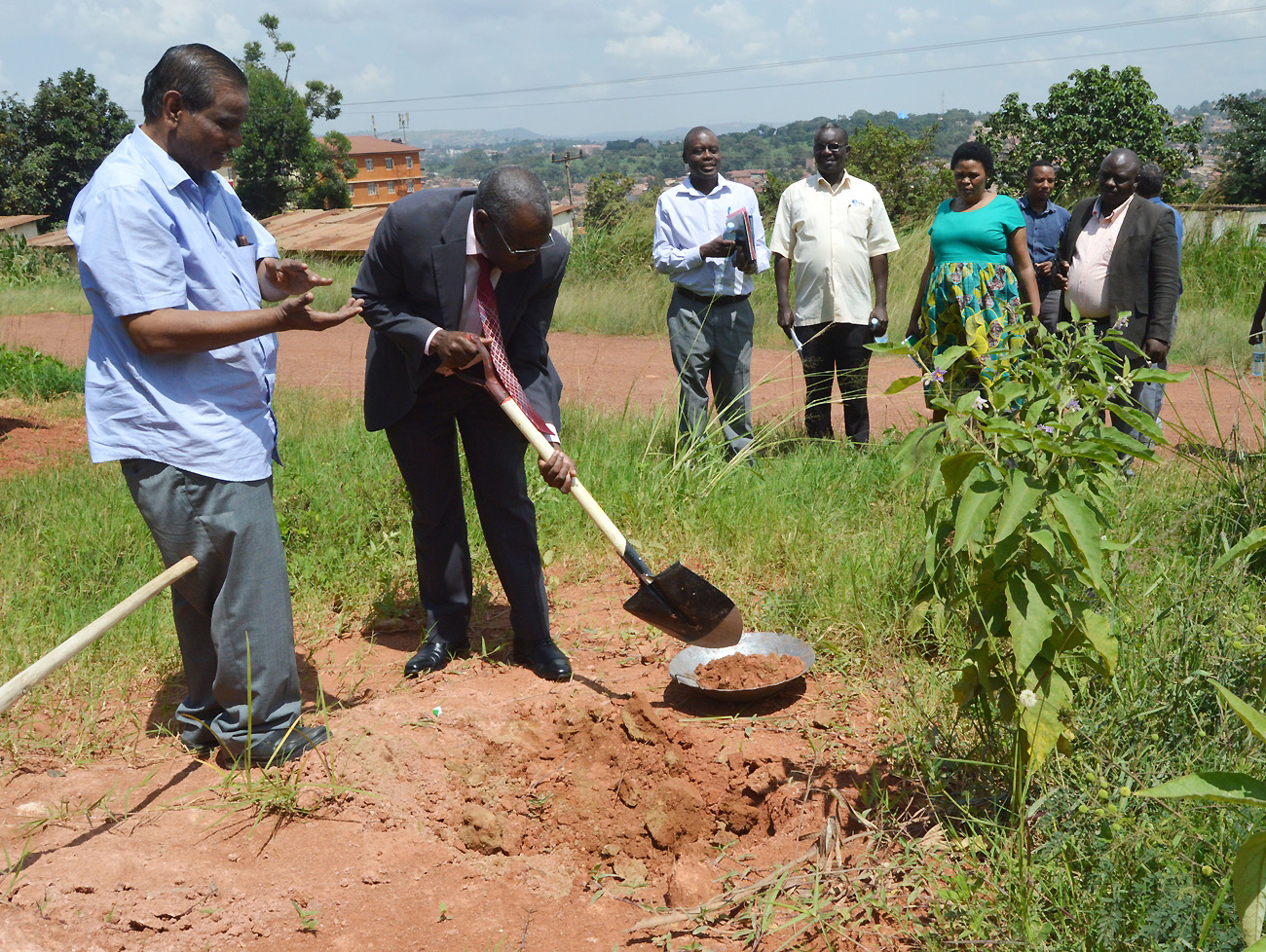Makerere University on Friday, 5th July 2019 broke ground for Phase II of the Food Technology and Business Incubation Centre (FTBIC) at the School of Food Technology, Nutrition and Bio-engineering (SFTNB), College of Agricultural and Environmental Sciences (CAES). Upon completion, the facility will allocate 1,200 of the total 7,000square metres space to the FTBIC; a huge boost to the current 1,200square metres completed under Phase I. Funding for the expansion to the tune of UGX5billion has been secured under the Presidential Initiative on Science and Technology.
Welcoming officials to the groundbreaking ceremony, the Dean SFTNB, Dr. Abel Atukwase thanked the University Council and Management for recognising the value of food technology and business incubation by ensuring that Phase II of the FTBIC kicks off and is completed successfully. He also thanked the leadership for securing funding for the project from Government.
The Manager, Procurement and Disposal Unit-Mr. Paul Agaba Muhire who also chaired the proceedings thanked the University officials, Project Manager, Contractor and Consultants present for attending the important ceremony. He assured all present that the Contractor had already received the funds required to kick-start the project and prayed for timely completion.
Representing the Acting University Secretary, Mr. Yusuf Kiranda, Ms. Komugisha Consolate congratulated Excel Construction Limited upon being awarded the FTBIC Phase II contract. She urged the contractor to ensure that construction is done according to the highest quality of standards and completed on time.
The Project Architect and Manager, Plan Systems represented by Arch. Isaac Nyabwana thanked the University Leadership for entrusting him with the responsibility of overseeing the project. He acknowledged that Excel Construction Limited holds a good reputation in the construction industry and prayed that this reputation would be upheld during the FTBIC Phase II project. In addition to technical expertise, Arch. Nyabwana assured all parties of good communication throughout the project, as it is a very important contributor to client satisfaction.

On behalf of Excel Construction Limited, the Senior Contracts Manager, Eng. Murali Krishna thanked Makerere University for entrusting his company with the FTBIC Phase II project. He shared that Excel had previously completed all its projects on time and reassured all parties that this would not be the exception.
The Principal CAES, Prof. Bernard Bashaasha acknowledged that Excel Construction had indeed completed all its on-campus as well as off-campus projects; at the Makerere University Agricultural Research Institute Kabanyolo (MUARIK) on time. He thanked Eng. Krishna for his reassurances of quality and timely completion and requested the contractor to be mindful of other users on site; especially as FTBIC Phase I houses a full-fledged bakery.
In his remarks, The FTBIC Manager Prof. William Kyamuhangire shared that SFTNB took the lead in building fully functional spaces at Makerere University by opening the first restaurant housed by an academic unit. “As a university we deal with a variety of people who have other needs in addition to their academic pursuits and so it was more imperative for the School of Food Technology, Nutrition and Bio-engineering to take the lead, especially in the food sector.”
Prof. Kyamuhangire further shared that the driving force for the FTBIC expansion are the increased calls from both Government and the general public for Makerere University to produce skilled graduates who can add value to fresh produce and create jobs for their communities.
“FTBIC is the unit of Makerere University that is open to all staff, students and the greater public with no strings or qualifications attached. However, you must demonstrate that you have a product that you would like to add value to. We shall then train you with the necessary skills to improve it, transfer technology and then once that is done, we can embark on the business side” explained Prof. Kyamuhangire.
Citing examples such as the Kiira EV and a variety of quality products produced under the FTBIC, Prof. Kyamuhangire added that Makerere University has earned the trust of Government by proving that funds allocated under the Presidential Initiative on Science and Technology can be put to good use. This, he hoped, would encourage Government to allocate the rest of the funds required for the completion of sub-phase II.
The FTBIC Phase II project will be further broken down into two sub-phases. Makerere University has already secured UGX5billion required for sub-phase I and needs approximately UGX15billion for sub-phase II.
Article by Public Relations Office.


 General2 weeks ago
General2 weeks ago
 Agriculture & Environment2 weeks ago
Agriculture & Environment2 weeks ago
 General1 week ago
General1 week ago
 Health2 weeks ago
Health2 weeks ago
 Research2 weeks ago
Research2 weeks ago



